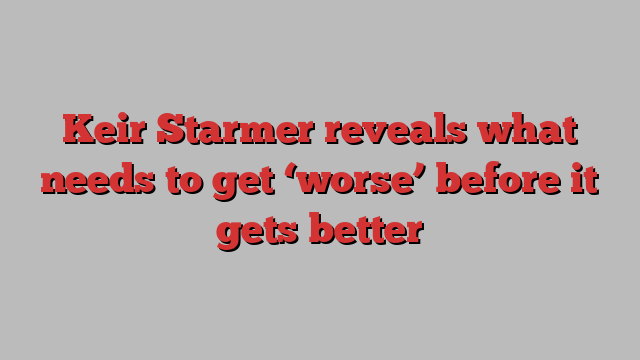
This article is an on-site version of our Inside Politics newsletter. Subscribers can sign up here to get the newsletter delivered every weekday. If you’re not a subscriber, you can still receive the newsletter free for 30 days
Good morning from Liverpool. One reason why this has been an unusual Labour party conference is this is an unusual moment in British politics. We have just had an election that replaced a Conservative government with a Labour one — in any case something that doesn’t happen all that often — and a party conference that has taken place after the King’s Speech but before the first Budget, something I don’t think has ever happened before.
As a result, most ministers’ speeches have been pretty uneventful, as was Keir Starmer’s yesterday (other than him saying the word “sausages” rather than “hostages” in his speech).
Inside Politics is edited by Georgina Quach. Read the previous edition of the newsletter here. Please send gossip, thoughts and feedback to [email protected]
What the world needs now
One reason why Keir Starmer’s declaration that “things will get worse before they get better” has landed badly, at least in regard to his and the government’s approval ratings, is that it simply wasn’t clear to anyone really what needed to “get worse”.
In 2010, David Cameron and George Osborne’s argument was that what needed to get worse was some public services: some would have to do more with less money and some things would stop entirely. There was clearly a recognisable theory of change that enjoyed the support of his party and some outside of it.
The most significant thing Starmer did in his speech was to give the first indications of what “worse” actually might mean:
So if we want justice to be served some communities must live close to new prisons.
If we want to maintain support for the welfare state, then we will legislate to stop benefit fraud. Do everything we can to tackle worklessness.
If we want cheaper electricity, we need new pylons overground otherwise the burden on taxpayers is too much.
If we want home ownership to be a credible aspiration for our children, then every community has a duty to contribute to that purpose.
If we want to tackle illegal migration seriously, we can’t pretend there’s a magical process that allows you to return people here unlawfully without accepting that process will also grant some people asylum.
If we want to be serious about levelling-up, then we must be proud to be the party of wealth creation. Unashamed to partner with the private sector.
And perhaps most importantly of all, that just because we all want low taxes and good public services that does not mean that the iron law of properly funding policies can be ignored, because it can’t.
One thing to note here is that a lot of these involve building things and the attendant disruption that comes with them, and none of them really lay the groundwork for further reductions in what the state currently does more broadly.
Just before flying to New York, the prime minister reiterated to BBC Today that listing these changes was about staving off the “politics of easy answers”: “Obviously there are always considerations about where you put anything, but this general idea — we’ve had it from the last government in spades — where you promise more houses, but then everybody can say ‘but not near me’, cheaper electricity but we can’t build the pylons, more people to prison but we haven’t built the prisons.”
British politics is going to continue to be in an odd state of phoney war between now and the Budget on October 30. But I think we should all expect to see in that Budget quite a lot about building and infrastructure.
Now try this
Because I am deeply misanthropic, there comes a time during party conference season when I am seized by a desire to spend the evening in my own company watching a film. I saw His Three Daughters again, which is now on Netflix, and really is a terrific movie.
Top stories today
-
Struggling on | Troubled intercity rail operator Avanti West Coast will not be stripped of its contract early by the UK government, according to people with knowledge of the plans.
-
‘For women, prison isn’t working’ | A new “women’s justice board” will be set up to cut the female prison population in England and Wales as part of a longer-term push to reduce the number of women’s jails, the justice secretary has said.
-
SNP under pressure | The number of homeless households in Scotland has hit a 12-year high as a widening housing crisis across the UK leaves record numbers in insecure accommodation.
-
Drab deal? | Corporate chiefs will be asking Labour to refund them for a £3,000-a-head business day at the party’s conference. The Times’s Geraldine Scott and Aubrey Allegretti heard from three companies that they would be asking for their money back after they got “minimal time” with ministers and were “talked [at] from the stage for four hours”.
-
Little rabbit | Rachel Reeves is considering boosting childcare funding to fuel growth, as a rabbit in her Budget, reports Bloomberg. According to people familiar with the matter, she sees parents returning to work as a way to boost growth and improve productivity, though one person warned she is yet to sign off any spending plans for October 30 and is unlikely to approve large commitments.
Recommended newsletters for you
US Election Countdown — Money and politics in the race for the White House. Sign up here
One Must-Read — Remarkable journalism you won’t want to miss. Sign up here